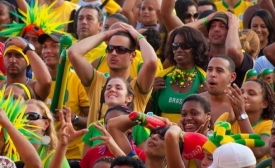sports diplomacy
When you think of North Korea, "cheerleaders" may not be the first thing that springs to mind. But the news that Pyongyang plans to send a "cheerleading squad" to the South Korean city of Incheon for the upcoming Asian Games is not just a surprising and weird news story – it may actually be quite an important political sign.
The partition of British India followed World War II, and ever since the independent states of India and Pakistan came into existence in 1947, the two countries have had a volatile relationship. On the tennis court, however, India's Rohan Bopanna and Pakistan's Aisam-ul-Haq Qureshi have mended some of the political and sporting divide between their two countries by forming a successful partnership on and off the court.

An overview of CPD's most popular blogs last month on topics ranging from Iranian soccer diplomacy to Turkey's Armenian initiative.
When huge protests rocked Brazilian cities a year ago, Raphael Rabelo was among the multitudes in the streets, even joining the thousands of demonstrators enraged with political corruption and spending on lavish World Cup stadiums who danced on the roof of the Congress building in Brasília. But in a U-turn reflecting shifting attitudes in Brazil about the soccer tournament now that it is underway, Mr.
The lines between the World Cup and diplomacy have always been blurry. On Tuesday, US Secretary of State John Kerry wrote an opinion piecein the Washington Post about the need to reach a comprehensive nuclear deal with Iran, as the 20 July deadline to reach a final agreement rapidly draws near. Perhaps with sport on his mind, he wrote: "There may be pressure to put more time on the clock."
By escaping from the Group of Death at the World Cup, the United States finally gave the lie to the notion that Americans were bad at soccer. Except Americans were never bad at soccer. The good soccer players just didn't know they were Americans.
Watching World Cup matches while drinking tax-free imported beer is an important part of diplomacy at the United Nations. The roars and groans of the thousands of diplomats who represent the UN’s 193 member states and support their national teams are loud enough to be heard across the world body’s New York headquarters. Right now, at least, international competition is taking center stage over cooperation on unrest in Iraq, the Syrian civil war and conflicts in Africa.
No matter how entrenched animosities in the Middle East may be, one principle is upheld by all: never miss an opportunity to miss an opportunity. The controversy over access to broadcasts of World Cup matches makes that clear. Pricing by Qatari entities holding World Cup rights for the Middle East and North Africa, including Al Jazeera's belN Sports channel, puts broadcasts beyond the reach of many football fans in the region. Inevitably, that is a public issue in a soccer-crazy part of the world.







